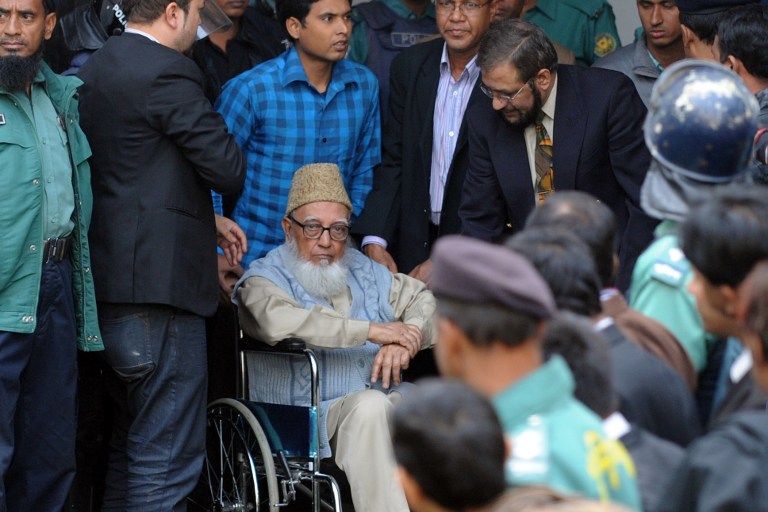SUMMARY
This is AI generated summarization, which may have errors. For context, always refer to the full article.

DHAKA, Bangladesh (2ND UPDATE) – A Bangladeshi court Monday sentenced an elderly top Islamist to 90 years in prison for masterminding atrocities during the 1971 independence war, amid deadly clashes between his supporters and police.
Ghulam Azam, 90, whom prosecutors compared to Nazi leader Adolf Hitler, was found guilty of five charges of planning, conspiracy, incitement, complicity and murder during the war against Pakistan.
Azam, the fifth person convicted at a war crimes court set up by the secular government, remained stony-faced in his wheelchair as the sentence was read out.
Jamaat-e-Islami, the country’s largest Islamic party and a key member of the opposition, called a nationwide strike to protest at the verdict, saying the trials are aimed at eliminating its leaders.
Azam, the wartime head of Jamaat and now its spiritual leader, was spared the death penalty because of his age and health, a senior government lawyer said.
“He was found guilty beyond reasonable doubt in all five charges and jailed 90 years. The tribunal observed that he deserved (the) death penalty,” junior Attorney General M.K. Rahman said.
“Some kind of justice is done but we are not happy,” he added.
Violence erupts
Violence erupted across Bangladesh ahead of the judgement, with Azam’s supporters clashing with police and paramilitary troops. They responded with rubber bullets and in some cases live rounds, officials said.
One protester was killed in the northwestern town of Shibganj, after paramilitary troops fired at Jamaat activists hurling homemade bombs, local police chiefs told AFP.
A low-level official from the ruling party was beaten to death by suspected Jamaat supporters in the southwestern district of Satkhira, the police chiefs said.
Police said they fired rubber bullets at protesters in the capital and the cities of Bogra, Comilla and Rajshahi after activists went on the rampage, attacking and torching dozens of vehicles.
The verdict
Previous verdicts by the tribunal have plunged the country, which has a 90 percent Muslim population, into political violence that has left at least 150 people dead.
Announcing the verdict, the tribunal said Azam held “superior responsibility” for the atrocities committed by militias which he helped to create to support the Pakistani army during the war.
“It has been proved that Ghulam Azam was the architect of the militia groups including Peace Committee, Al Badr, Rajakar,” judge A.T.M. Fazle Kabir told the packed tribunal.
Prosecutors had sought the death penalty for Azam, describing him as a “lighthouse” who guided all war criminals and the “architect” of the militias.
When India intervened at the end of the nine-month war and it became clear Pakistan was losing, the militias killed dozens of professors, playwrights, filmmakers, doctors and journalists.
Azam was described as the mastermind of the massacres of the intellectuals. Many of their bodies were found a few days after the war in a marsh outside the capital, blindfolded and with their hands tied behind their backs.
Azam’s lawyer Tajul Islam pledged to appeal, saying the charges were based on newspaper reports of speeches Azam gave during the war, which led to the creation of Bangladesh.
“We’ll definitely appeal. The evidence presented by the prosecution miserably failed to prove him guilty. It’s a perverse judgement,” he told AFP.
Calling for strikes
Jamaat and secular groups have called for rival nationwide strikes on Tuesday, raising the spectre of more clashes in the impoverished nation.
In the capital several thousand secular protesters gathered to reject the verdict as too lenient. “If he doesn’t deserve death, who does?” said student activist Lukcy Akter in a central Dhaka square.
The opposition has criticised the cases as politically motivated and aimed at settling old scores rather than meting out justice.
Three of the four Islamists previously convicted by the tribunal have been sentenced to death, and one was given life imprisonment.
Unlike other war crimes courts, the Bangladesh tribunal is not endorsed by the United Nations. The New York-based Human Rights Watch group has said its procedures fall short of international standards.
The government maintains the trials are needed to heal the wounds of the 1971 war in which it says three million died. Independent estimates put the death toll at between 300,000 and 500,000. – Rappler.com
Add a comment
How does this make you feel?
There are no comments yet. Add your comment to start the conversation.